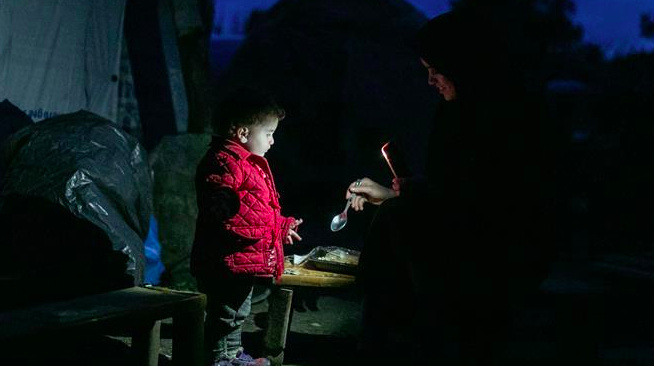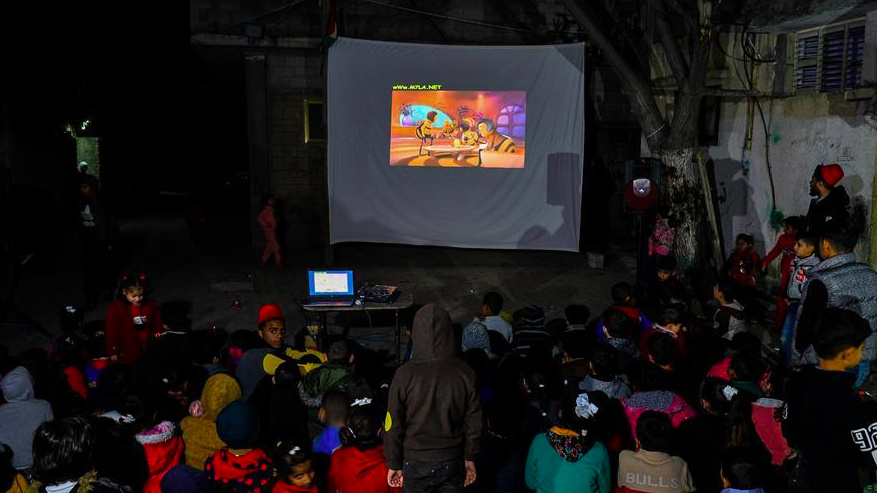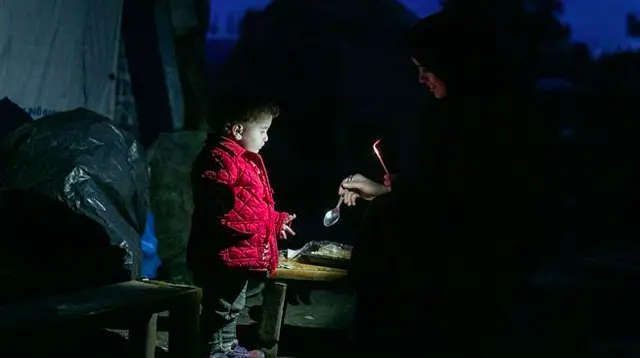
A woman feeds her child at Vial refugee camp of Chios, Greece, on December 23, 2019. /Xinhua
Editor's note: Iram Khan is a Pakistan-based commentator on international and commercial affairs. The article reflects the author's opinions, and not necessarily the views of CGTN.
A great dichotomy of our times is making developing nations pay for the problems created by the developed ones. While the former are struggling to overcome their economic, political, and social challenges, they are pulled back for reasons beyond their control. International organizations like the UN strive to alleviate this predicament but calls fall on deaf ears when the stakeholders have huge budgets or sophisticated militaries.
The haunting visuals of refugees landing – oftentimes dead – on foreign shores are a true depiction of a catastrophe they had no hand in making. Children, women, and men leave their homelands and set out to embrace perils on the way to the same countries which have contributed to their suffering.
While doing so, they face an increasingly hostile media. The "flood" of illegal migrants, the "swarms" of refugees, and the "challenge" to the modern way of life by foreigners are some of the terminologies used to generate xenophobia against an already vulnerable population. If this is a crisis, it will remain one until politicians, now feeling its heat, get serious in addressing the root causes.
The rise in refugees' influx coincides with right-wingers gaining support in the West. From the Alternative for Germany to France's National Rally, political parties are gradually mainstreaming views that were once considered aberrations. Some, like the League in Italy, even called immigration an "ethnic cleansing" of their countrymen.
Leading among these parties is the U.S. Republican Party in its current shape under Donald Trump. Riding on populist narratives, Trump swept to power in a country that is least eligible to raise anti-immigrant rhetoric. Building walls on borders and telling U.S. citizens of specific heritages to go back only contributes to demonizing refugees who are looking for better prospects just like forefathers of present-day Americans did.
The single biggest cause of the problem is war. Unsubstantiated claims of Weapons of Mass Destruction that have left the Middle East in shambles are, again, associated with the governments voicing the most against refugees. The lawlessness that ensued the war in Iraq and Syria led to the birth of extremist organizations, further exacerbating the situation. Although some level of stability has returned to Iraq, Syrians continue to flee bombs from a multitude of state and non-state entities.
Afghanistan, likewise, has been devastated by decades of strife. In the 70s, a Soviet invasion and the subsequent American response – through what we today call the Taliban – pushed millions of Afghans out of their homes. The U.S. invasion of 2001 had the same effect. As belligerents continued fighting, the common Afghan sought refuge in far off lands.
Another multitude trying to enter European borders is from sub-Saharan Africa. They take a perilous journey to Libya, cross the Mediterranean on makeshift arrangements and attempt to reach the long European coastline. When NATO intervened in Libya in 2011, the country plunged into chaos and its ability to hold back arrivals from sub-Saharan regions plummeted to zero.
Most parts of Africa are former colonies of the countries where policymakers are up in arms against illegal and legal migrants. For a major period in the last two centuries, imperialistic powers squatted on their colonies, sucked out resources, and deprived them of the chance to industrialize.
Developing nations, after having missed the opportunity in the pre-WTO global order, took the course of debts to spur their industrialization. Not having the capacity for paybacks, their economies crashed and resulted in people heading to the countries of their past colonial masters.
Developed nations are also responsible for aggravating the matter by being the largest contributors to climate change. Their sprawling industrial complexes and massive vehicular populations have high emission rates which result in warming of the planet. Economies of disadvantaged territories, mostly being agricultural, consequently receive the brunt of changing weather patterns.

Palestinian children watch a cartoon movie screened on a large white screen set up in one of the poor alleys at Nuseirat Refugee Camp, in central Gaza Strip, January 26, 2020. /Xinhua
Despite that, industrialized states are not taking climate change seriously. In one extreme case, the U.S. unilaterally retreated from the Paris Agreement on climate change in 2019. More recently, documents from the U.S. Interior Department were leaked in the media, which claimed inaccurately that scientists have not reached a consensus on global warming.
Illegal immigration can be solved by reorientation of priorities in the international governance system. Foremost is the end of endless wars. Conflicts in the Middle East, Afghanistan, and parts of Africa have caused more deprivation than solving the world's issues.
Instead of bombing people to rid them of extremism, capital needs to be spent on capacity building of their countries. This way, local mechanisms of fighting extremism and crime can be boosted for the long term. Besides, it will provide an environment conducive to commercial activity and more attractive than foreign lands for their residents.
The countries the refugees are escaping need investment, not aid. With rising manufacturing costs and saturating markets in the first world, developing nations present exactly the opposite outlook. Building their economies and raising a sustainable industrial sector there will expand a middle-class that will have less incentive to take precarious paths.
In sum, the refugee problem is an economic one. The wars, the debts, and climate change are leading to reduced opportunities in regions that are already impoverished. Global political bodies need to realign their strategies and redefine the zero-sum approach of a handful of rich nations if the pursuit of a shared future is to be made a priority.
(If you want to contribute and have specific expertise, please contact us at [email protected])
 简体中文
简体中文





